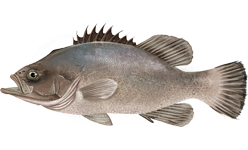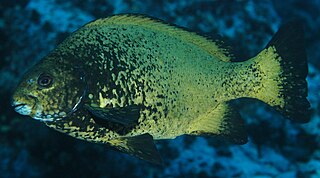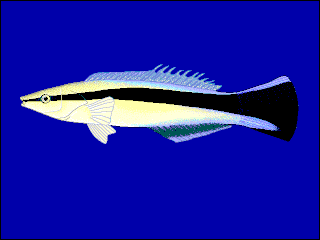
Acropomatidae is a family of ray-finned fish in the order Acropomatiformes, commonly known as lanternbellies. Acropoma species are notable for having light-emitting organs along their undersides. They are found in all temperate and tropical oceans, usually at depths of several hundred meters. There are about 32 species in as many as 9 genera, although some authorities recognise fewer genera than Fishbase does.

Holacanthus is a genus of marine angelfishes. The eight species are particularly abundant near volcanic rocks and coral islands. Some are highly valued as food, but even more so for aquaria, as all are brightly colored.

Notothenioidei is one of 19 suborders of the order Perciformes. The group is found mainly in Antarctic and Subantarctic waters, with some species ranging north to southern Australia and southern South America. Notothenioids constitute approximately 90% of the fish biomass in the continental shelf waters surrounding Antarctica.

The wreckfish are a small group of ray-finned fish in the genus Polyprion, belonging to the monotypic family Polyprionidae in the order Acropomatiformes.

Trichogaster is a genus of gouramis native to South Asia from Pakistan to Myanmar. It is the only genus in the monotypic subfamily Trichogastrinae as set out in the 5th Edition of Fishes of the World, although that book states that there are two genera, the other being Colisa which is treated as a synonym of Trichogaster by Fishbase and the Catalog of Fishes. Fishbase also places the genus in the Luciocephalinae. Species of this genus are very popular in the aquarium trade.

The sea chubs, also known as rudderfish and pilot fish and in Hawaiian as enenue or nenue, are a family, Kyphosidae, of fishes in the order Perciformes native to the Atlantic, Indian and Pacific Oceans usually close to shore in marine waters.

Stichaeidae, the pricklebacks or shannies, are a family of marine ray-finned fishes in the suborder Zoarcoidei of the order Scorpaeniformes. Most species are found in the North Pacific Ocean with a few in the North Atlantic Ocean.

Oplegnathus is currently the sole recognized genus in the knifejaw family (Oplegnathidae) of marine centrarchiform ray-finned fishes. The largest, the Cape knifejaw, can reach a maximum length around 90 cm (35 in). Knifejaws have teeth fused into a parrot-like beak in adulthood. They feed on barnacles and mollusks, and are fished commercially. They are native to the Indian and Pacific Oceans.
Remora is a genus of remoras native to temperate to tropical marine waters worldwide.

Dermatolepis is a genus of marine ray-finned fish, groupers from the subfamily Epinephelinae, part of the family Serranidae, which also includes the anthias and sea basses. They are found in the western Atlantic, Pacific and Indian Oceans.

Plectropomus, commonly known as the coral groupers, is a genus of marine ray-finned fish, groupers from the subfamily Epinephelinae, part of the family Serranidae, which also includes the anthias and sea basses. They are found in the Indo-Pacific region.

Conodon is a genus of grunts native to the Pacific and Atlantic coasts of the Americas. The currently recognized species in this genus are:

Labroides is a genus of wrasses native to the Indian and Pacific Oceans. This genus is collectively known as cleaner wrasses, and its species are cleaner fish.

Heteromormyrus is a genus of freshwater ray-finned fishes belonging to the family Mormyridae, the elephantfishes. These fishes are found in southern and central Africa in Angola, Namibia, the Democratic Republic of the Congo and, maybe, Zimbabwe.
Polyacanthonotus is a genus of spiny eels, with these currently recognized species:

Bangana is a genus of fish in the family Cyprinidae, the carps and minnows. It is distributed across much of southern and eastern Asia. Species live mainly in the flowing waters of tropical and subtropical rivers.

Fodiator is a genus of flying fishes. It is the only genus in the subfamily Fodiatorinae.

Pseudocaranx is a genus of ray-finned fishes from the family Carangidae, the jacks, trevallies, scads, and pompanos. They occur in the western Atlantic Ocean and the Indo-Pacific.

Selene is a genus of carangids, commonly known as lookdowns and moonfishes, native to the Atlantic Ocean and the eastern Pacific Ocean.

Pelates, is a genus of ray-finned fish in the family Terapontidae, containing 3 species.


















